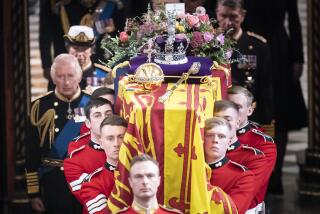Margaret Thatcher’s death dominates British headlines
LONDON – An influential and divisive figure in life, former British Prime Minister Margaret Thatcher dominated the national headlines here after she died at the age of 87.
British television and radio stations broke into their regularly scheduled programming Monday to broadcast obituaries, tributes and archival footage of Thatcher, the country’s first female prime minister, who transformed British political and economic life with her conservative, free-market policies.
But some viewers criticized the BBC for not requiring that its news anchors wear black ties while reporting on Thatcher’s death. The British broadcaster drew heavy fire when its veteran news reader, Peter Sissons, wore a burgundy tie while covering the queen mother’s death in 2002.
A BBC spokesman told the Telegraph: “The guidance is to dress as appropriate, to dress soberly.”
Analysis and memories of Thatcher’s career continued to dominate the airwaves Tuesday morning. Newspapers provided extensive coverage of Thatcher’s death on their websites and in their print editions.
The conservative Daily Telegraph and Daily Mail newspapers devoted their front pages to the same smiling, back-lighted portrait of Thatcher. “The Woman who saved Britain 1925-2013” read the Mail headline. The Telegraph simply published the dates against a black background.
The Times published a special edition with a wrap-around cover showing Thatcher waving to the crowds during a visit to Moscow in 1987.
“Of British politicians, only [Winston] Churchill has inspired more books, imitators and myths,” wrote Times columnist Ben Macintyre.
“Long before her death, Lady Thatcher had become a noun (Thatcherism) and an adjective (Thatcherite), terms of approbation to some, and deep disapproval to others. But she never doubted that her path was the right one, as the unswerving lady who crushed the unions, revitalised the economy, won the Cold War and repelled the Argentinean invaders.”
The Sun tabloid offered a typically irreverent take. “Maggie dead in bed at Ritz,” the paper declared on its front page. Readers were also offered a “24-page Iron Lady tribute.”
The Daily Mirror, a strident critic of Thatcher’s government, dubbed her the “woman who divided a nation.” Thatcher stared grimly from a head shot on the front page. “So should she really be given a ceremonial funeral like Diana?” the paper asked.
An editorial in the left-wing Guardian described Thatcher’s legacy as “public division, private selfishness and a cult of greed that together shackle the human spirit.” But the paper acknowledged that she left an indelible mark on British public life.
“Whether you were for her or against her, Margaret Thatcher set the agenda for the past three and a half decades of British politics. All the debates that matter today in the public arena, whether in economics, social policy, politics, the law, the national culture or this country’s relations with the rest of the world, still bear something of the imprint she left on them in her years in office between 1979 and 1990.”
Local news outlets made no bones about Thatcher’s unpopularity among working-class communities in northern England, Wales and Scotland, where many lost their livelihoods when her government closed Britain’s mines in the 1980s.
A blog post on the Newcastle Chronicle website said: “She will most likely be remembered in the region for the bitter miners’ strikes and perceived dismantling of heavy industry.”
The Liverpool Echo quoted Mayor Joe Anderson as saying: “Her strength of character and determination were to be admired, but I firmly believe her policies were misguided and inflicted huge damage on cities like Liverpool.”
“Thatcherism is still alive and kicking,” Anderson continued. “Part of her legacy, her Tory values were about making inequality more prevalent. The social injustice, the attacks on the poor -- we are still seeing that today.”
ALSO:
Margaret Thatcher: In her own words
Margaret Thatcher is lionized and lambasted
Queen Elizabeth to attend Margaret Thatcher’s funeral April 17
Janet Stobart is a news assistant in the Times’ London bureau. Staff writer Alexandra Zavis reported from Los Angeles.
twitter.com/@alexzavis
More to Read
Sign up for Essential California
The most important California stories and recommendations in your inbox every morning.
You may occasionally receive promotional content from the Los Angeles Times.










